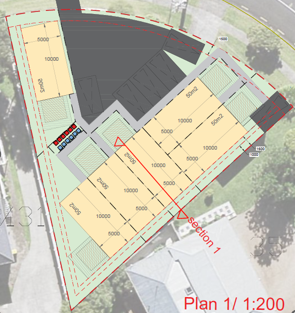
Written by Imogen Trupinic, Senior Planner at Thomas Consultants
The first step before undertaking works of any kind on your site is to know what you can and cannot do on the site.
Once you know your property’s development potential and limitations, you can avoid hidden development costs, abatement notices or prosecution by Council. The best way to consolidate all the information before buying a property or starting a development project is through a feasibility report.
What is a feasibility report?
A development feasibility report is provided by our planning team and gives an overview of your site conditions, features and development potential. A feasibility reports includes:
- Any encumbrances listed on the record of title which would affect what can be built on the site;
- Site features such as the topography ,natural hazards listed on Council GIS (e.g. overland flow paths), and the features of the surrounding environment;
- Stormwater, wastewater and water supply servicing available for the site;
- The planning history of the site;
- Whether the site is listed as contaminated or subject to instability in Council’s records;
- The district plan zone of the site and how it influences design and activities;
- Special planning overlays or other controls (e.g. Significant Ecological overlay) as well as what this means for potential development;
- The subdivision requirements for the site;
- Geotechnical requirements (e.g. consents required for earthworks or groundwater impacts);
- Transport requirements for the development (e.g. number of vehicle access points allowed);
- Other relevant rules and standards in the district plan (e.g. noise and vibration, signage);
- Proposed plan changes that may increase or restrict development (eg: Plan Change 78 to the Auckland Unitary plan which impacts;
- The outline for the process includes possible Council fees and the specialists needed for each stage of the process.
- Our planners also advice on development options.
Who does a feasibility report help?
A feasibility report is particularly helpful for the following people:
- Property-buyers as it gives them an overview of what they can and cannot undertake on the property that they are considering purchasing. It is often recommended by lawyers that property-buyers obtain a feasibility report at the due diligence phase of the purchase process.
- Property-owners who are considering undertaking a private project on their site (e.g. minor dwelling) as it provides them with an overview of whether they require resource consent for their project and the relevant design constraints.
- Investors/Developers who are considering undertaking a new project on a site (e.g. multi-unit terraced house development) as it indicates what can be successfully approved by Council for the site.
- Real Estate Agents/Property Vendors as it showcases what can be achieved on the site for buyers who are thinking of developing, so it can be an attractive marketing tool.
How do I get a feasibility report?
The simplest and most thorough way is to speak with one of our experienced planners. To provide you with a comprehensive feasibility report our planners will ask you for the following information:
- The record of title and property file for the property;
- What development you intend to undertake on the site; and
- Whether you have already started undertaking any works on the site.
When talking about your proposed development it’s important to have all the details clear in your mind.
- For multi-unit projects: Specify the desired number of units (e.g., apartments, townhomes) upfront.
- For flexible options: Request a bulk and location study to explore possibilities.
Below is an example of a design concept plan that shows the number of units possible on this specific site.

To request a feasibility report, or to find out more, please feel free to contact one of our friendly planning team on 09 836 1804 or email info@tcec.co.nz.






